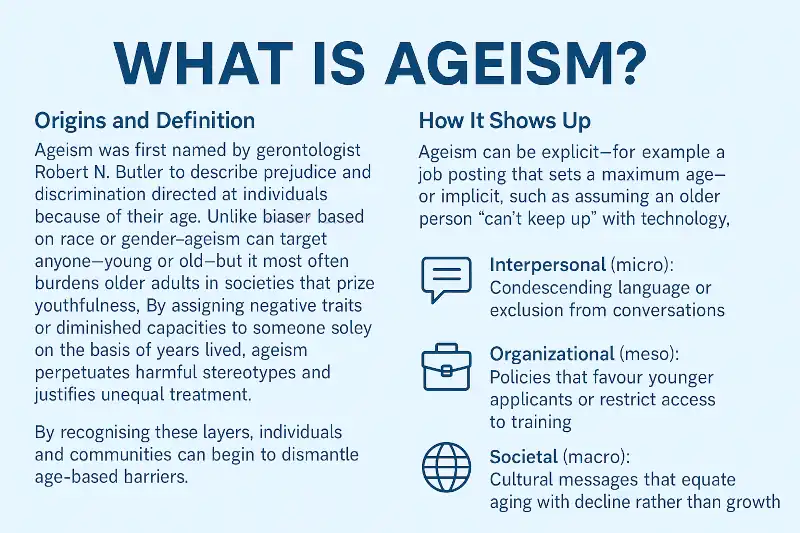Let’s Tackle Ageism and Create Communities Where Every Generation Thrives with Dignity and Respect.
In South Africa, millions of older adults quietly face exclusion not because of their ability, but because of their age. Whether you’re planning your retirement in your 30s or already enjoying your golden years, ageism can affect your opportunities, self-worth, and even your financial future.
We’ve already explored how to create meaningful, secure retirement years in “5 Powerful Strategies for a Comfortable Retirement in South Africa,” and we’ve looked at the mindset shifts that lead to emotional well-being in “Practical Tips to Transform Your Mindset through The Power of Gratitude.” Now, we turn to an often-overlooked challenge that stands in the way of dignity and fulfilment later in life.
This blog post dives deep into what ageism really is, how it shows up in everyday life, and most importantly, what you can do about it.
You’ll learn:
- How to spot ageist behaviours and protect yourself,
- Why internalised ageism can limit your confidence and opportunities,
- What legal protections do you have in South Africa?
- And how simple strategies can restore respect, security, and purpose.
Let’s expose the realities of ageism—and help create a retirement that’s not just long, but dignified, respected, and fully lived.

What Is Ageism?
Origins and Definition
Ageism was first named by gerontologist Robert N. Butler to describe prejudice and discrimination directed at individuals because of their age. Unlike biases based on race or gender, Ageism can target anyone—young or old—but it most often burdens older adults in societies that prize youthfulness. By assigning negative traits or diminished capacities to someone solely on the basis of years lived, Ageism perpetuates harmful stereotypes and justifies unequal treatment.
How It Shows Up
Ageism can be explicit—for example, a job posting that sets a maximum age—or implicit, such as assuming an older person “can’t keep up” with technology. It operates on three levels:
- Interpersonal (micro): Condescending language or exclusion from conversations.
- Organisational (meso): Policies that favour younger applicants or restrict access to training.
- Societal (macro): Cultural messages that equate aging with decline rather than growth.
By recognising these layers, individuals and communities can begin to dismantle age-based barriers.
The Impact of Ageism on South African Retirees
Economic Consequences
Despite protections in the Labour Relations Act and Employment Equity Act, many older workers experience Ageism when seeking new roles or contract renewals. Research shows that job seekers over 50 often face rejection tied to assumptions about adaptability rather than actual performance. This contributes to early or forced retirement, reducing lifetime earnings and pension contributions. With the average replacement ratio for retirement income at just 25% of final salary, Ageism amplifies financial insecurity for those who can least afford it.
Social and Emotional Costs
Beyond finances, Ageism undermines self-worth and social connection. Persistent exposure to negative stereotypes can lead to internalised shame or reluctance to participate in community activities. When older adults feel invisible or patronised—told to “act your age” or spoken over in group settings—the resulting isolation chips away at mental and emotional health. A culture that tolerates Ageism ultimately diminishes the quality of life for all its members.
Spotting the Warning Signs
In Everyday Interactions
- Condescension: Being spoken to in a patronising tone or called overly “sweet.”
- Unwanted advice: Assumptions that older adults need constant guidance on simple tasks.
- Exclusion: Left out of family, social, or recreational plans based on presumed limitations.
In Institutions
- Hiring policies: Age caps or “recent graduate only” clauses that indirectly screen out mature candidates.
- Healthcare bias: Dismissal of symptoms as “just old age,” leading to inadequate treatment.
- Financial services hurdles: Loan denials or restrictive insurance terms citing advanced age.
Recognising these patterns is crucial: what feels like an isolated incident may actually be part of a broader tapestry of Ageism.
Legal Protections and Rights
South African law provides clear avenues for contesting age-based discrimination:
- Labour Relations Act: Protects employees from unfair dismissal on the grounds of age, unless the normal retirement age applies.
- Employment Equity Act: Prohibits arbitrary age limits in recruitment and promotion.
- Older Persons Act: Mandates reporting and protection mechanisms for elder abuse, including negligent or discriminatory treatment.
Anyone facing Ageism is encouraged to document incidents, seek advice from human resources, or consult the Commission for Conciliation, Mediation and Arbitration (CCMA) for mediation and legal recourse.
Practical Strategies for Individuals
Personal Empowerment
Combating Ageism begins with cultivating self-awareness and a mindset of continual growth. Each individual has the power to rewrite the narrative around ageing by how they live, learn, and interact.
Challenge stereotypes: Start by recognising any internalised biases you may hold about ageing, such as the belief that older adults are less capable, adaptable, or relevant. Replace those narratives with real-life stories and role models who defy those assumptions. Actively seek out diverse media, books, or talks that showcase older adults thriving in various roles—entrepreneurs, artists, leaders, or community builders.
Maintain skills: Prioritise ongoing learning as a way to remain confident and current. Enrol in digital literacy workshops, online courses, or local community classes that strengthen your technological and professional capabilities. Staying engaged in learning not only enhances employability but also promotes mental agility and resilience, pushing back against the notion that older people are “outdated.”
Building Support Networks
Creating strong, meaningful relationships is one of the most effective ways to counter the isolating effects of Ageism. A connected life reinforces self-worth and provides collective strength to challenge societal biases.
Family involvement: Encourage respectful, transparent communication with loved ones. Talk about ageing openly—what it means to you, what support looks like, and how each person can contribute to a mutually respectful family culture. Invite family members to participate in shared responsibilities, hobbies, and celebrations that affirm the value of every generation.
Peer groups: Join or create community groups where older adults have active roles in leadership and collaboration. Whether it’s a book club, faith-based gathering, fitness class, or service organisation, being part of a group that values your voice reinforces a sense of belonging and personal significance.
Intergenerational connection: Make intentional efforts to build bridges across age groups. Volunteer for mentorship programmes where you can pass on your knowledge and experience. Attend or organise intergenerational events that promote mutual respect and storytelling. These interactions not only enrich relationships but also break down stereotypes from both directions, creating a more inclusive social fabric.
Interesting Articles
- Newcastle 2025: Thriving in the Heart of Northern KZN – A Fresh Chapter for Retirees at La Gratitude
- Retirement Accommodation Options in South Africa (2025): Balancing Comfort, Care, and Community
- Donating to retirement homes is a valuable and impactful act
- Why do Trending Topics on Ageing, Trend at this time?
How La Gratitude Homes Defeats Ageism
A Culture of Respect
At the heart of La Gratitude Homes is a deep conviction that every resident deserves to be seen, heard, and celebrated, regardless of age. Our “Team That Makes It Happen” of more than 110 passionate professionals undergoes specialised training in person-centred care, ensuring that individual histories, preferences, and abilities guide every interaction. Through resident-led councils and daily rituals—such as celebrating personal milestones and inviting peer feedback—we nurture a shared sense of ownership and purpose. Patronising language and stereotyping have no place here; instead, kindness, curiosity, and mutual respect form the foundation of our community.
Holistic Care, Safety & Comfort
True wellbeing blends physical security with emotional reassurance. La Gratitude delivers on this promise through:
- On-site medical support: Regular wellness checks and immediate access to qualified practitioners mean concerns are addressed promptly—never dismissed as “just old age.”
- Adapted living environments: Our cottages, flats, and communal spaces are designed with sensory-friendly features and social hubs that encourage independence and spontaneous conversation.
- Dynamic wellness programmes: From gentle exercise classes to art and music workshops, residents pursue their passions free from age-based assumptions.
The Team & Our Community Commitment
Guided by a Senior Management team with over 35 years’ experience and a community-nominated Board of Control, La Gratitude extends its care beyond our three Newcastle-district sites. We actively champion outreach and awareness programmes—both rural and urban—providing vital services to vulnerable older persons, youth, and families throughout Amajuba and beyond.
Our social-responsibility initiatives—from intergenerational school visits to collaborative health-education events—reinforce our mission to protect rights, uplift dignity, and share wisdom across generations. This holistic approach doesn’t just reject Ageism; it replaces it with a powerful vision of ageing as a season of continued growth, contribution, and community.
Modern Living Flats

Basic Cottages

Modern Comfort Cottages

Comfortable Frail Care

Conclusion
Ageism need not define the retirement experience. By understanding its roots, spotting its signs, and asserting legal and personal strategies, older South Africans can reclaim agency, dignity, and joy. At La Gratitude Homes, we’re committed to a community where every resident thrives—safe, supported, and celebrated. Contact us today to arrange a personal visit, meet our team, and discover how respectful, age-affirming care makes all the difference.

Citations
Trusted References to Deepen Understanding and Support Your Message
- World Health Organization (WHO)
Ageing: Ageism – World Health Organization (WHO)
https://www.who.int/news-room/questions-and-answers/item/ageing-ageism - Healthline
What’s Ageism, and Why Does It Matter?
https://www.healthline.com/health/ageism - Iberdrola
Ageism – Iberdrola
https://www.iberdrola.com/talent/ageism - MBLH South Africa
Age Discrimination in South Africa: Safeguarding the Rights of Older Employees
https://www.mblh.co.za/OurInsights/Articles/age-discrimination-in-south-africa - IOL (Independent Online)
Population increasingly ageing and this has planning and policy implications – Stats SA survey
https://www.iol.co.za/capeargus/news/population-increasingly-ageing-and-this-has-planning-and-policy-implications-stats-sa-survey-f3aaae30-8d6d-464f-bc16-62c4e2bcf3a2 - University of Cape Town News
One in 10 older adults in SA are subjected to abuse, research finds
https://www.news.uct.ac.za/images/userfiles/files/media/UCT%20Elder%20Abuse%20Research.pdf - U.S. Department of Justice
Red Flags of Elder Abuse
https://www.justice.gov/elderjustice/red-flags-elder-abuse - Tafta (The Association for the Aged)
Shameful truth about elder abuse
https://www.tafta.org.za/elder-abuse - Medical News Today
What is ageism, and how does it affect health?
https://www.medicalnewstoday.com/articles/ageism - Age Discrimination Info
South Africa – Age Discrimination
https://www.agediscrimination.info/international-age-discrimination/south-africa
.
Thank you for your continued support, we appreciate your likes, follows and retweets on Facebook, Twitter, Pinterest and LinkedIn. Make sure to share this post with friends and family.
You can make a difference
With your assistance, the volunteers at La Gratitude will be able to take better care of not only the residents at the old age home but also the greater Newcastle community. La Gratitude is constantly involved in outreach projects to help the elderly in need in and around Newcastle.
Your donations will be greatly beneficial in the provision of food and other basic necessities for the less fortunate elderly people that require assistance.
Donating is easy, click here to donate now.








